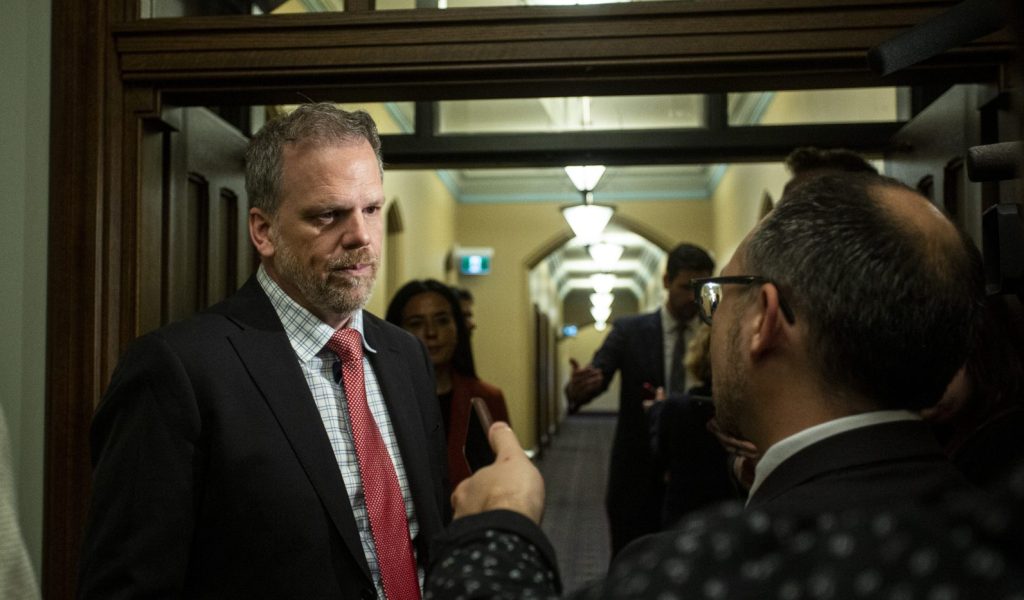Despite the pharmacare bill referencing only a ‘single-payer’ program, Health Minister Mark Holland says people with private insurance for contraceptives and diabetes-related pharmaceuticals can keep their plans following the implementation of national pharmacare. The Hill Times photograph by Andrew Meade
BY TESSIE SANCI | June 8, 2024
The language in the pharmacare bill is ‘fatally flawed,’ according to pharmacare expert Dr. Steve Morgan.
The Liberal government’s highly anticipated pharmacare bill promises a single-payer program, but what that means exactly is unclear as Health Minister Mark Holland continues to say publicly that people on private insurance plans can keep using those plans.
Bill C-64, the Pharmacare Act, outlines principles that are meant to assist the Liberals in their “aim of continuing to work toward the implementation of national universal pharmacare,” as per the bill’s wording. The federal government wants to begin coverage with “universal, single-payer, first-dollar coverage” of some pharmaceuticals related to diabetes and contraception.
“The [bill’s] language is fatally flawed because of its ambiguity,” said Dr. Steve Morgan, a professor at the University of British Columbia and a well-known pharmacare expert who has advocated for a single-payer program for many years. “[Pharmaceuticals are] a critical and massive component in the health-care system, and yet this legislation doesn’t define terms such as what does ‘single payer’ mean? What does ‘universal’ mean? What does ‘first dollar’ mean? What does ‘public’ mean?”
None of those terms are defined in the legislation, which is an outcome of the supply-and-confidence agreement between the Liberals and the New Democratic Party. Instead, definitions are limited to the following: “Indigenous Peoples,” “Minister,” “pharmacare,” and “pharmaceutical product.”

“We understand the term ‘single payer’ to be one payer, and we understand the term ‘universal’ means everybody is on that plan,” said Stephen Frank, president and CEO of the Canadian Life and Health Insurance Association, which has advocated for a mixed-payer program where national pharmacare would focus on coverage for those without access to a private plan.
“If that’s not what this means, then those need to be defined differently in the act,” Frank told Hill Times Research.
Single-payer coverage would typically mean that drug coverage is provided by one payer. In this case, that payer would be the federal government. But Holland (Ajax, Ont.) has publicly said that individuals with private plans can remain on those plans following the program’s implementation.
Asked about that detail by his parliamentary secretary, Yasir Naqvi (Ottawa Centre, Ont.), at a May 23 House Health Committee meeting, Holland said that was “100 per-cent right,” and Canadians would be able to maintain their private insurance coverage.
Holland said the same during a scrum in West Block on June 4. When asked by Hill Times Research if those with private insurance for contraceptives and diabetes-related pharmaceuticals could keep their plans following the implementation of national pharmacare, Holland’s one-word answer was “yes.”
But Bill C-64 does not mention the continuation of private insurance plans. Instead, it makes references to “universal” and “single payer,” as well as the Canada Health Act. For example, the preamble states that the “step-by-step implementation of national universal pharmacare” is “to be guided by the Canada Health Act.”
The Canada Health Act requires that health care provided by physicians and in hospitals be paid for by the provinces and territories. The federal government contributes to that public funding through the Canada Health Transfer.
“Those terms [in the Canada Health Act] have been defined in the courts over 30 to 40 years to mean publicly administered, etc.,” Frank said. Private insurers “can’t provide coverage for physicians and hospitals.”

Another concern is how Bill C-64 would be interpreted in a court if it were ever legally challenged.
“Legislation is the law of the land. If you go to court, the court pulls the legislation out and interprets that; they don’t take a scrum from the minister and say, ‘that’s the rule,’” Frank said on June 5 in reaction to Holland’s comments to Hill Times Research the previous day.
The health insurance industry also has questions about whether it could legally cover diabetes-related pharmaceutical products and contraception in light of the fact that the federal government plans to cover a selection of those. (The federal government published a list of products it would cover on Feb. 29—the same day that Bill C-64 was introduced in the House of Commons.)
Holland answered that question during the June 4 scrum.
“A private plan will continue to operate as it has with the drugs that it covers. We are going to cover a base-level of drugs… We’re going to talk with provinces to establish what we might be able to do for that or beyond,” Holland said. “And then a private carrier will continue to offer the coverage that they have… There’s nothing about the legislation that in any way contemplates an interruption of that private care.”
Frank told Hill Times Research that he would like to see that clarification in the legislation.
Feds aim to compare two pharmacare pilot projects
Since the bill was first introduced in the House in February, Holland has referred to the national pharmacare program as a pilot project.
Another related pilot project is a funding arrangement with Prince Edward Island’s government, in which Ottawa has been providing money to the province to help increase access to medications for those who are eligible for any one of the province’s 26 public drug plans. This improved access has occurred in part by reducing out-of-pocket costs for those who use a P.E.I. plan to help pay for medication.
Unlike the proposal for “universal” national pharmacare, P.E.I.’s drug plans are not available to all Islanders. Eligibility can depend on financial need, the type of illness someone has, or their age, amongst other criteria.
“I don’t think we have all the data,” Holland said on June 4. “I want to be able to take a look at these two models not as theoretical concepts, but as things that are actually living and breathing in the real world, so that as we expand out to other drugs [beyond diabetes medications and contraceptives], we can know what model is best.”
“I think eventually when we roll out an entire pharmacare plan, there will have to be a decision [as to] whether or not it’s a fill-in-the-gaps P.E.I. model or whether it’s a single-payer universal model,” Holland added.
When asked how the government expects to compare the two models if they both rely on a mixed-payer system, Holland said, “They’re not [both mixed-payer] in the sense that the model that will be for contraceptives and will be for diabetes drugs–anybody can have access to it.”
Morgan said that the health minister won’t get the “real-world data” he’s looking for on a single-payer system if the government goes ahead with a national program that keeps private insurers in the mix.





